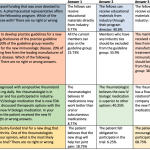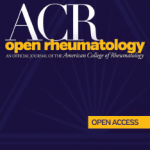As a new year begins, Government Affairs Committee chair Blair Solow, MD, takes stock of ACR advocacy wins in 2019 and issues to watch in 2020.
Search results for: social media

Legal Updates: Tips for Protecting Your Patients’ Health Information
In the daily shuffle of evaluating patients and focusing on the delivery of high-quality patient care, the importance of protecting patient information may get overlooked. Human error is just one possible way patient information can be compromised. Cybersecurity attacks are becoming more numerous and sophisticated every day, with the number of patient records compromised increasing….

Meet the Incoming Arthritis & Rheumatology Editor in Chief, Dr. Daniel Solomon
Daniel Solomon, MD, MPH, has practiced rheumatology for more than 20 years, all while conducting translational and clinical research and teaching young clinicians. Soon, he will also step into the role of editor in chief of Arthritis & Rheumatology, as Richard J. Bucala, MD, PhD, ends his tenure. He will assume some duties during a…

My Experience at the 2019 Rheumatology Research Workshop: Opportunity to Meet Peers & Role Models
I had the opportunity to attend the Rheumatology Research Workshop in Washington, D.C., in June 2019. Held annually, this two-day meeting is run by the ACR Early Career Investigators (ECI) Subcommittee and is geared toward trainees at all levels (fellows, residents and medical students) and junior faculty with an interest in a rheumatology research career….

Ethics Forum: What Are Conflicts of Interest?
Results from an ethics survey presented to attendees at the 2018 ACR/ARHP Annual Meeting highlight the complexities and challenges of assessing potential conflicts of interest.
Annual Meeting Preview: Effective Advocacy By & For ACR/ARP Members
Session attendees will hear about recent successes from the Government Affairs Committee and learn how to become effective rheumatology advocates.
Sit Back & Enjoy Learning at the 2019 ACR/ARP Annual Meeting
With innovative session formats and unique spaces that encourage networking, the 2019 ACR/ARP Annual Meeting will offer new and exciting opportunities for rheumatology professionals. Here’s a sneak peek…

New Study Asks Why Lupus Patients Don’t Take Their Hydroxychloroquine
Hydroxychloroquine (HCQ) therapy may effectively manage systemic lupus erythematosus (SLE) in many patients, but that doesn’t mean patients will take it as often as they should. In fact, results from a recently published study found that about half of SLE patients were not adherent.1 The study was led by Lucy H. Liu, MD, MPH, a…

New ACR Open Rheumatology Journal Delivers Science to Wide Audience
The ACR’s newest journal, ACR Open Rheumatology (ACROR), launched in 2019 with all articles published in full online. The journal publishes high-quality, rigorously peer-reviewed articles on original investigations in rheumatology research, including basic science, clinical science, epidemiology, health outcomes and education, as well as commentaries and reviews. Open access is on the rise. A 2017…
Patients & Physicians Unite for Arthritis Advocacy
Nearly 120 ACR/ARP member advocates and rheumatology patients were on Capitol Hill this week fighting for rheumatology as part of the ACR’s Advocates for Arthritis conference.
- « Previous Page
- 1
- …
- 11
- 12
- 13
- 14
- 15
- …
- 49
- Next Page »